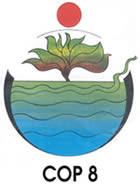 |
|
|
|||||||||||||||||||
|
|
||||||||||||||||||
| ROUND TABLES OF THE HIGH-LEVEL SEGMENT: | ||
| CLIMATE CHANGE AND SUSTAINABLE DEVELOPMENT | ||
COP-8 President Baalu opened the session and Co-Chair Valli Moosa (South Africa) said the Delhi Declaration should draw the link between COP-7 in Marrakesh, the WSSD, and COP-8. |
||
 |
||
 SLOVAKIA stressed the need to move beyond politicised negotiation to real reduction action. |
||
 |
||
|
|
||
 NIGERIA emphasized social development and poverty alleviation as developing country priorities. |
||
 |
||
 |
||
| ROUND TABLE: WRAP-UP | ||
 SAUDI ARABIA said that the Declaration should be a consensus document prioritizing adaptation to climate impacts and the impacts of Annex I response measures. |
||
 ICELAND addressed carbon intensities and the need to stimulate the development of technologies to avoid wasteful emissions. Highlighting the gap between Annex I and non-Annex I countries |
||
| CONTACT GROUP: | ||
 NON-ANNEX I ISSUES: Chaired by José Romero (Switzerland) met throughout the day. In the morning, delegates discussed the structure of the guidelines. In the afternoon, SBI Chair Estrada convened a high-level contact group and introduced a new draft of the improved guidelines. |
||
| SBI: | ||
 Left photo: Chair Estrada convened the SBI late in the evening. |
||
| NON-ANNEX I NATIONAL COMMUNICATIONS: | ||
| Consideration
of the fourth compilation and synthesis of initial national
communications: Parties agreed the draft decision for consideration by
the COP (FCCC/SBI/2002/L.23). |
||
|
Improvement
of the guidelines for the preparation of non-Annex I national
communications: Chair Estrada said the draft decision was not yet
available. Noting that delegations had a number of suggestions, additions
and proposals for the document, he said Parties had agreed to adopt the
guidelines "in a spirit of compromise." The EU requested to see the
decision. Chair Estrada suspended the meeting for 30 minutes. Upon
reconvening, the EU repeated her request to see the text. CANADA stressed
"normal" UN procedures by which documents are seen before they are
adopted. Chair Estrada adjourned the meeting, saying the text would be
ready for consideration Friday. |
||
|
Links
|
|
Back to Linkages home - Visit IISDnet
- Send e-mail to ENB |



